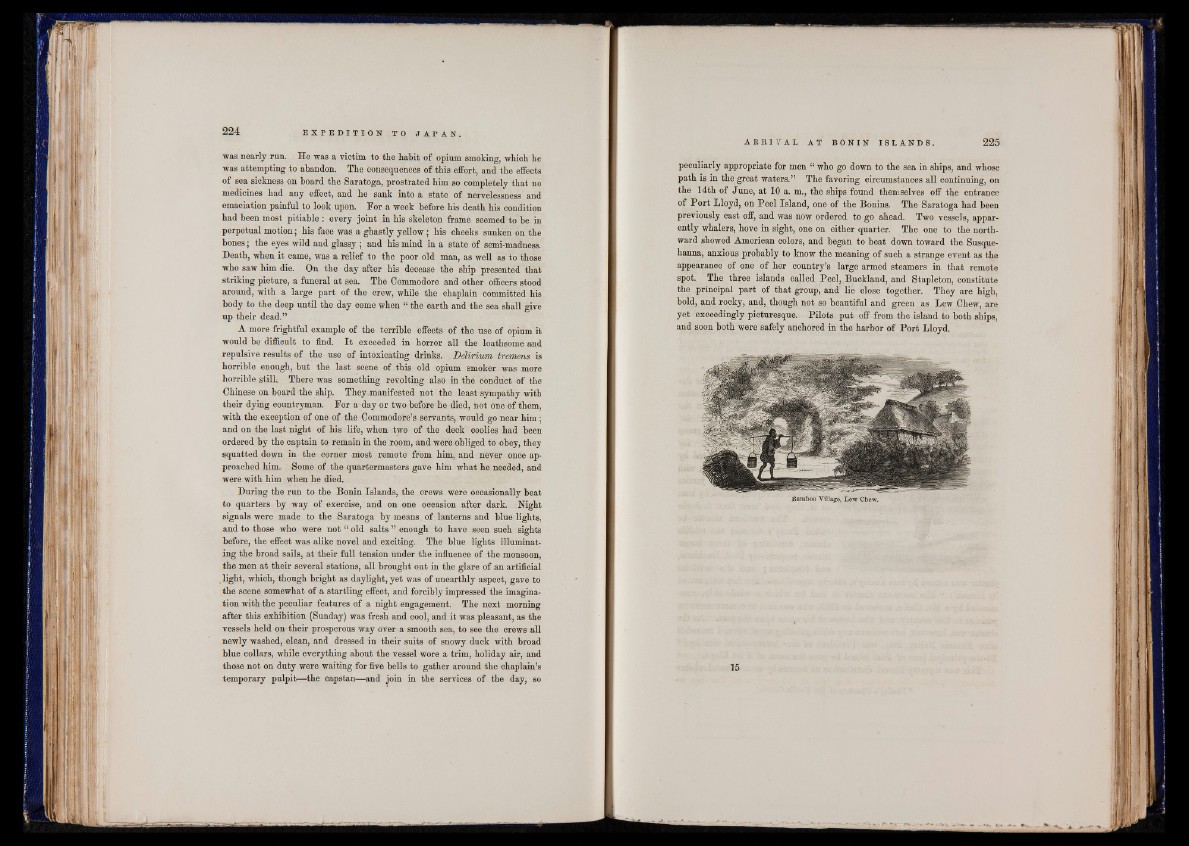
was nearly run. He was a victim to the habit of opium smoking, which he
was attempting to ahandon. The consequences of this effort, and the effects
of sea sickness on board the Saratoga, prostrated him so completely that no
medicines had any effect, and he sank into a state of nervelessness and
emaciation painful to look upon. For a week before his death his condition
had been most pitiable : every joint in his skeleton frame seemed to he in
perpetual motion; his face was a ghastly yellow ; his cheeks sunken on the
bones; the eyes wild and glassy ; and his mind in a state of semi-madness.
Death, when it came, was a relief to the poor old man, as well as to those
who saw him die. On the day after his decease the ship presented that
striking picture, a funeral at sea. The Commodore and other officers stood
around, with a large part of' the crew, while the chaplain committed his
body to the deep until the day come when “ the earth and the sea shall give
up their dead.”
A more frightful example of the terrible effects of the use of opium it
would be difficult to find. I t exceeded in horror all the loathsome and
repulsive results of the use of intoxicating drinks. Delirium tremens is
horrible enough, hut the last scene of this old opium smoker was more
horrible still. There was something revolting also in the conduct of the
Chinese on board the ship. They manifested not the least sympathy with
their dying countryman. For a day or two before he died, not one of them,
with the exception of one of the Commodore’s servants, would go near him ;
and on the last night of his life, when two of the deck coolies had been
ordered by the captain to remain in the room, and were obliged to obey, they
squatted down in the corner most remote from him, and never once approached
him. Some of the quartermasters gave him what he needed, and
were with him when he died.
During the run to the Bonin Islands, the crews were occasionally beat
to quarters by way of exercise, and on one occasion after dark. Night
signals were made to the Saratoga by means of lanterns and blue lights,
and to those who were not “ old salts ” enough to have seen such sights
before, the effect was alike novel and exciting. The blue lights illuminating
the broad sails, at their full tension under the influence of the monsoon,
the men at their several stations, all brought out in the glare of an artificial
light, which, though bright as daylight, yet was of unearthly aspect, gave to
the scene somewhat of a startling effect, and forcibly impressed the imagination
with the peculiar features of a night engagement. The next morning
after this exhibition (Sunday) was fresh and cool, and it was pleasant, as the
vessels held on their prosperous way over a smooth sea, to see the crews all
newly washed, elean, and dressed in their suits of snowy duck with broad
blue collars, while everything about the vessel wore a trim, holiday air, and
those not on duty were waiting for five bells to gather around the chaplain’s
temporary pulpit—the capstan—and join in the services of the day, so
peculiarly appropriate for men “ who go down to the sea in ships, and whose
path is in the great waters.” The favoring circumstances all continuing, on
the 14th of June, at 10 a. m., the ships found themselves off the entrance
of Port Lloyd, on Peel Island, one of the Bonins. The Saratoga had been
previously cast off, and was now ordered to go ahead. Two vessels, apparently
whalers, hove in sight, one on either quarter. The one to the northward
showed American colors, and began to beat down toward the Susquehanna,
anxious probably to know the meaning of such a strange event as the
appearance of one of her country’s large armed steamers in that remote
spot. The three islands called Peel, Buckland, and Stapleton, constitute
the principal part of that group, and lie close together. They are high,
bold, and rocky, and, though not so beautiful and green as Lew Chew, are
yet exceedingly picturesque. Pilots put off from the island to both ships,
and soon both were safely anchored in the harbor of Port Lloyd.
Bamboo Village, Lew Chew.
15